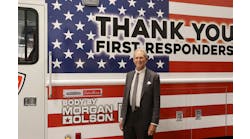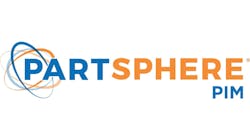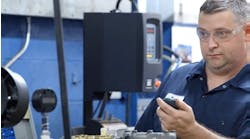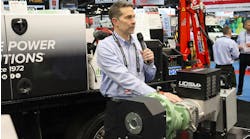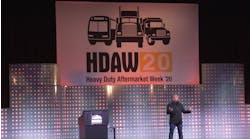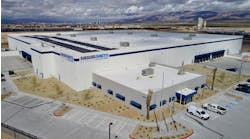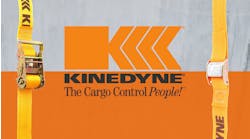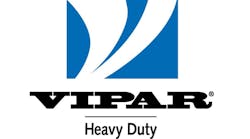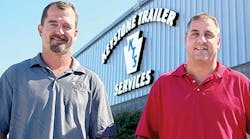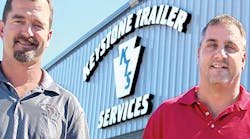Keeping trailers repaired and refurbished is key for Keystone Trailer Services
TRAILER parts are no different than vehicle parts. They wear out.
Replacing them in a timely and efficient manner has always been closely tied to the success, safety, and economics of the shipping operation. And it’s even more critical today, with a beefed-up CSA program and the Federal Motor Carrier Safety Administration (FMCSA) tracking hundreds of violations relating to vehicle maintenance, many of which can be the result of a single failed trailer part.
At Keystone Trailer Services (KTS) in York, Pennsylvania, they are focused on keeping their customers’ trailers fully compliant and safe.
“With the way CSA and all types of regulations are working, it’s in our customers’ best interest to have a trailer that’s going to go through a DOT checkpoint and pass,” president Nicholas Hauck says. “Our customers want to know. My goal is for that trailer to leave here and go through a DOT checkpoint and pass. They don’t want to come back for the same thing twice. I worked for my dad at H&L Sales, a storage trailer rental business, back in the early 1990s. You didn’t have all the regulations we have today. He wasn’t putting a door on anything. Get some tape and put it on it—that was the mentality I came from. I had to learn to understand the customer today wants a quality repair fixed right, and they don’t want to ever deal with that roof leaking again or that ABS issue.”
Keystone Trailer Services installs 95% of the parts it sells. And with the company quadrupling its revenue in the past four years with expanded service that led to the addition of two bays last year, parts are a bigger priority. Keystone became a Vanguard parts dealer a year ago. Now the big question: How far does the company take this?
“It’s something we’re constantly looking at and evaluating,” Hauck says. “Do we go to that next step? Because that’s a big thing with inventory management. Are we going to spend $100,000 to build an addition to manage these parts? Are we going to slow down our mechanics by doing this? Or are we going to get into it big and get a few salesmen that go out and sell to everybody and their brother and really go with it? I’m either, ‘Let’s go or not.’ It’s kind of, ‘Let’s have a good plan in place before we just decide to go. I definitely don’t like to sell it before you can provide it. I say, ‘Here’s what I’m going to be able to do for you today.’ ”
Says general manager Dan Shenberger, “We were actually having that conversation today. We have moved all of our parts into one bay to have them all in the same area. We have not caged the inventory yet. That is the question. We are thinking about it. Right now, mechanics grab parts as they need them and write them down on their work order. To lock down your parts and control your inventory with a much tighter approach does cost the shop time. They have to ring a buzzer to get parts. It’s a different way of living than we’re used to. Usually we want the guy to get a part and get back to the shop.”
“Ultimately we want to have a cart together with the parts on it and say, ‘Here, put all of this stuff on,’ ” Hauck adds. “You’re always going to need something else to the point where you wouldn’t be able to do that 100%, but it’s back to the receiving—knowing what the trailer needs when it gets here and have it ready for them. I always go back to having a cart: eight bays and eight carts. ‘This is yours,’ and provide it. That’s been probably one of the things that has evolved the most here, and it’s still not where it needs to be, but I can remember back to when I first got started. It was a free-for all.
“And just controlling your inventory. You use something once that you didn’t have and say, ‘Let’s buy three of them,’ and the other two sit there for three or four years and you forget you have them. I’ll be the first to say we’re not the poster child for how to run trailer parts inventory yet. But I plan to be. It’s a constant evolution with us, how the parts are handled. The last thing we want is three guys standing at the parts counter waiting on a $4 part. Before we have that cage and have that parts desk where they go, we’re still developing and trying to get better with how we handle this. We sell labor—keeping that guy working with the right things he needs to keep doing his job is more of a focus than making sure we didn’t lose seven 3/8” bolts today. Not that that’s not important.”
Shenberger came to Keystone from another company that had $8 million in parts and 9000 different numbers. The company’s other locations in Texas and California were issuing parts from the York warehouse inventory, so the company locked out that ability to do that.
“The scale was much greater,” he says. “Some of those parts were $50,000 apiece—a big motor or compressor. Here, we’re on a much smaller scale. So do you spend that $100,000 or $150,000 a year to maintain or maybe lose $5000 a year? The only way to make it make sense is to embrace a parts distributor atmosphere—a concerted effort to market and sell parts. Right now, we use a very high percentage of these parts to repair trailers. We don’t sell parts straight to customers as a part of our business plan. But we have buying power because now we’re a Vanguard dealer. We’re right at that crossroads going, ‘Should we or shouldn’t we?’”
Hauck says they toyed with the idea of turning a bay into parts warehouse with dock doors and a whole storefront. But they decided their need for more mechanics and shop space outweighed the “what-ifs of parts distribution.”
“I know I can do it with mechanics out there, and I know what numbers we can produce each month,” he says. “They’re pretty good. Why wouldn’t I do that, as opposed to guessing on the other side of it? That’s how we ended up with two more shop bays as opposed to 4000 square feet of warehouse and dock doors.”
Organizing the shop
Keystone added two more bays at the end of the shop last December, increasing the total to eight. Most of the major body work on trailers is done in that area, with a wall separating the addition from the rest of the shop.
“They’re down there buck-riveting constantly, so it helped with the noise level,” Hauck says. “You’ve got a guy on the other side of the shop trying to do inspection and trying to find an air leak that he’s listening for. If you’ve got a guy bedside him bucking rivets, you can’t hear anything. So from that side of things, it’s helped us a lot. Just the sound control itself.”
Keystone is a full-service tractor-trailer repair company focusing mostly on south-central Pennsylvania, with a 50-mile radius onsite mobile service, maintenance, 250-mile radius jockey service, container customization and storage, and equipment transport.
It offers a wide variety of services, including tractor trailer repair and refurbish, tractor and trailer parts, state and FHWA inspections, clutch and transmission replacement, and suspension repair.
Established in 1999, it has a 20,500-square-foot facility sitting on a 26-acre lot right off Interstate 83. It has eight bays and 19 full-time technicians.
Hauck is doing exactly what he started out doing. Back in the ‘90s, Hauck owned another company, Hauck Transports, which he says was “basically me, a cell phone, and truck, with me delivering trailers for dealers and leasing companies.”
“Our business is built on trailers, and we’ve always stayed focused on trailer repair,” he says. “Dry vans, flatbeds—that’s the backbone of our business. I don’t think there’s anything we can’t do, especially to a dry van or flatbed. Reefers are kind of another animal structurally, so we tend to stay away from them. The backbone of our business is dry van maintenance and repairs.”
He started out by leasing a building on Rt. 30 and then bought the current property in 2004, constructing a shop in 2007.
“With the amount of property we have for actual storage we’re able to offer our customers, we can enter into 200-, 300-trailer deals, and we have the capacity to store trailers and essentially handle the whole package for the customer from cradle to grave,” he says. “We receive the trailers. Whether we pick them up or they get dropped here, we manage the whole project for them—identification, trade terms, any kind of repairs that need to be made, reinstalling decals, and delivery at the end or verification of pickup. We’re doing that with multiple customers. So we have 50 of this guy’s and 100 of that guy’s. A lot of it is Wabash Duraplates, but it can be anything.”
Says Shenberger, “We repair trailers for the dealers’ customers. Trailer dealers do business with us for many reasons. Typically it’s all about location and/or available storage space. We have customers who are not located anywhere near us. They buy trailers in our back yard and it’s cheaper to have them checked and repaired here rather than dray them across the United States. We have other dealers that simply struggle to get them through their own shops in a timely fashion. Sometimes deals just require an independent third-party mediator.”
Hauck has added truck repairs—devoting the first two bays to that—because he has some customers who might have 15 or 20 trailers and three trucks, and it’s convenient for them to bring all of their equipment to Keystone to be maintained.
“We’ve grown in that without trying,” Hauck says. “We still take the same approach that we’re going to do quality repairs and quality work in a timely manner. But there’s so much more that can go wrong with a truck than there is with a trailer. The days of going out and fixing a truck with a test light and a screwdriver are over. It’s a computer. And none of the manufacturers want to give you any support to their software, so that’s $10,000 a year for Cummins and Cat for upgrades and training. There’s just so much more to it, and it’s constantly changing.
“Trailers have stayed fairly the same, other than ABS. They’re still just trailers. It’s a lot easier to go out and buy some software to test ABS than Cummins diagnostics. For the most part, a brake chamber is a brake chamber on a trailer. A landing leg is a landing leg. They’re not all using something different. I can’t imagine how these guys stock a truck-repair service truck. I mean, you almost need a trailer, or just accept you’re not going to have all the parts, and just check it and then go back and get parts.”
Honored for growth
Last year, the Central Penn Business Journal named Keystone one of central Pennsylvania’s top 50 fastest-growing companies, honoring it for its 86% revenue growth between 2011 and 2014. While Hauck says he’s not “an award-driven guy,” he was proud of the award.
“We’ve grown tremendously, especially in the past four years, and we’ve done it without acquisitions,” he says. ““It’s not like we bought somebody. We’re in business. We sell labor.
“I attribute it 100% to the people working here. The team attitude, the customer service attitude, taking pride in what you do, making sure we do good-quality repairs at a good price, taking care of customer needs. If he calls up and needs a light, but you also see he has a hole in the side of trailer, why not let him know about it? Because he’s relying on a truck driver who probably put the hole in it and doesn’t want to tell anybody. So we try to do a little bit more than just take that phone call where they need a mudflap.
“We’ve gotten so much more efficient inside the walls here as far as getting mechanics what they need. We’re trying to get to the point of telling them what to do, as opposed to them telling us what they did. It took me awhile to get to the point where I’d hire a non-billable person, but it takes more managers today to manage the crew. It’s constant. It requires constant maintenance and fine-tuning and evaluating yourself: Am I setting this guy up to fail or succeed?
“We have a strong team. We have as strong of a team as we’ve ever had, and that team mentality is really what we’ve tried hard to establish. We all need to do our jobs every day for everybody to have a job. I would trust all 19 of those mechanics with anything. It’s not like this is the only guy who can do brakes. They all cross-trained. We’re always looking.”
Says Shenberger, “Our customer base has grown at such a rate that I wish we could find more guys more quickly. I could have Nick buy three more service trucks, because we could go crazy with that end of the business. As soon as we have a truck on the road, they’re swamped.”
Both say Keystone is not afraid to think outside-of-the-box, and has made significant strides with technology.
“We’re receiving trailers on tablets through QuickBooks, and our ultimate goal is to have tablets in mechanics’ hands with everything right there—pictures, and what to fix, showing them exactly what we need them to do and helping them figure out how to accomplish it,” Hauck says.
Says Shenberger, “It’s proven that it works. We’re just getting some of the fine-tooth-comb stuff done. For example, categorizing parts. The hard part was talking to our base core operating system. Right now, it’s cool. I take the tablet. You come here and I put in the VIN, mileage, and your customer name from our operating system. I get all the information and hit ‘synchronize.’ I take pictures and they go to my server and network folder where everybody can pull from. It automatically creates a work order. The part we’re working on is some of the mandated forms. They’re creating custom PDFs. There will be a box to click and it will say, ‘inspection required,’ and it will actually bring out their own inspection form.”
Adds Hauck, “We’re baby-stepping, trialing it with one service-truck guy. We’ve got some bugs to work out. I’m not going to go out and buy 19 tablets and say, ‘Here, guys.’ ”
Keystone also has created a training trailer where entry-level workers can do, for example, a brake job.
“We can get them to the next level and feeling confident we’re putting a person in a position to succeed because you know you have given them the proper tools and training,” Hauck says. “You have to really help the guys, educate them. And they’re receptive to that. They want to know what you expect from them, not just ‘fix this trailer.’ ”
Keystone also has placed a strong emphasis on refining its Internet capabilities with Search Engine Optimization (SEO). Many Midwest companies are moving their business to central Pennsylvania, and the warehousing business has expanded dramatically. They’re finding Keystone easily.
“Nobody uses Yellow Pages anymore—they’re all going onto Google and hitting ‘trailer repair in York PA,’ ” he says. “We’re first, the last time I checked. We put a lot of emphasis in that and I think that’s a big part of our growth. Local trucking companies have shrunk a bit. We used to have some 150-truck operators out of this area that have been bought. Celadon just came in here and bought up one. The JB Hunts and Schneiders of the world keep trying to gobble them up because they need drivers.
“It’s a constant evaluation we’re doing to make sure we’re still holding onto our core. I put most emphasis on a 10-mile radius of here, and then we go from there. I’d much rather fix that guy’s trailers across the street than having to send a guy to Scranton. We’re trying to make sure we’re capitalizing on our local business.
“But the big growth has come from the guys out of the Midwest coming in here with all these warehouses. They have 20 trailers dedicated to them. We’ll go up there and maintain them and let them know when they have a trailer out of service—a lot of times before they know it.”
And finally on the technological front, Hauck has purchased a drone and is toying with the idea of using it to track trailer inventory on his lots.
“I flew it for the first time today, so I’m not ready to talk about it because I’m not sure if it will work,” he says. “From a verification standpoint, I think it would work. I’m anxious to try a couple of different things. A trailer comes in with damage to the roof. Right now, I have to have a guy climb up there with a ladder in the parking lot. I’m almost thinking I can use a drone.
“I think it’s an interesting little addition. It’ll get people talking. It’s at least intriguing. They’re cheap enough that you can try it and if it doesn’t work, I’ll give it to my kids and they’ll have a ball with it.”
After 16 years as Keystone Trailer Services’ president, Hauck is starting to be asked, “What comes next?” It’s a question that vexes him because he’s locked into making sure the company gets even better at what it’s doing right now.
“I want to be the best at what we do and get it to the point where I don’t know that I’ll ever be satisfied,” he says. “Just keep fine-tuning it. And ultimately, it’d great to open up another facility once we have all these things in place—processes and procedures and the way of managing it. I’d certainly look at another location.
“Or we could build more bays here. It’s not like we’re locked into just this footprint. We can definitely build. I have a 14-acre parking lot next door that’s just a big parking lot. There are two little buildings on it. There’s an old farmhouse we converted into office space, and we lease that out, and a trash company has a shop here.”
The important thing to him is to never lose sight of what he wants his company to be.
“Trailers, trailers, trailers,” he says. “Always have been. We found a niche that really works out well for us. We’re just trying to get better at it every day. I don’t want to sound like a Home Depot commercial, but never stop improving. That’s one of the things we live by.
“It’s been a very enjoyable ride. We’re all pretty driven. Every day is an opportunity to see what that next phone call brings. That’s really what it’s all about.” ♦
